Developing a Personal Philosophy for Early Childhood Education
VerifiedAdded on 2022/08/23
|5
|1269
|35
Essay
AI Summary
This assignment presents a personal philosophy statement developed by a student aspiring to become an early childhood educator. The essay articulates the author's core beliefs about young children, emphasizing their unique capabilities and the importance of fostering a healthy learning environment. It discusses key educational theories, including those of Maria Montessori and Lev Vygotsky, to support the belief that educators should observe, facilitate, and provide autonomy to children. The philosophy addresses the educator's role in identifying children's interests, promoting inclusive classrooms, and enhancing their knowledge and skills. The author highlights the significance of love, respect, and open communication to build trust and inspire children's love for learning. The assignment also underscores the importance of aligning teaching practices with the Australian Professional Standards for Teachers (AITSL) and the National Quality Standard (ACECQA) to meet the specific learning requirements of every child, including those with disabilities. In conclusion, the author views their role as a facilitator to shape the values and capabilities of young children, encouraging them to reach their full potential by developing their love for knowledge and strong values.
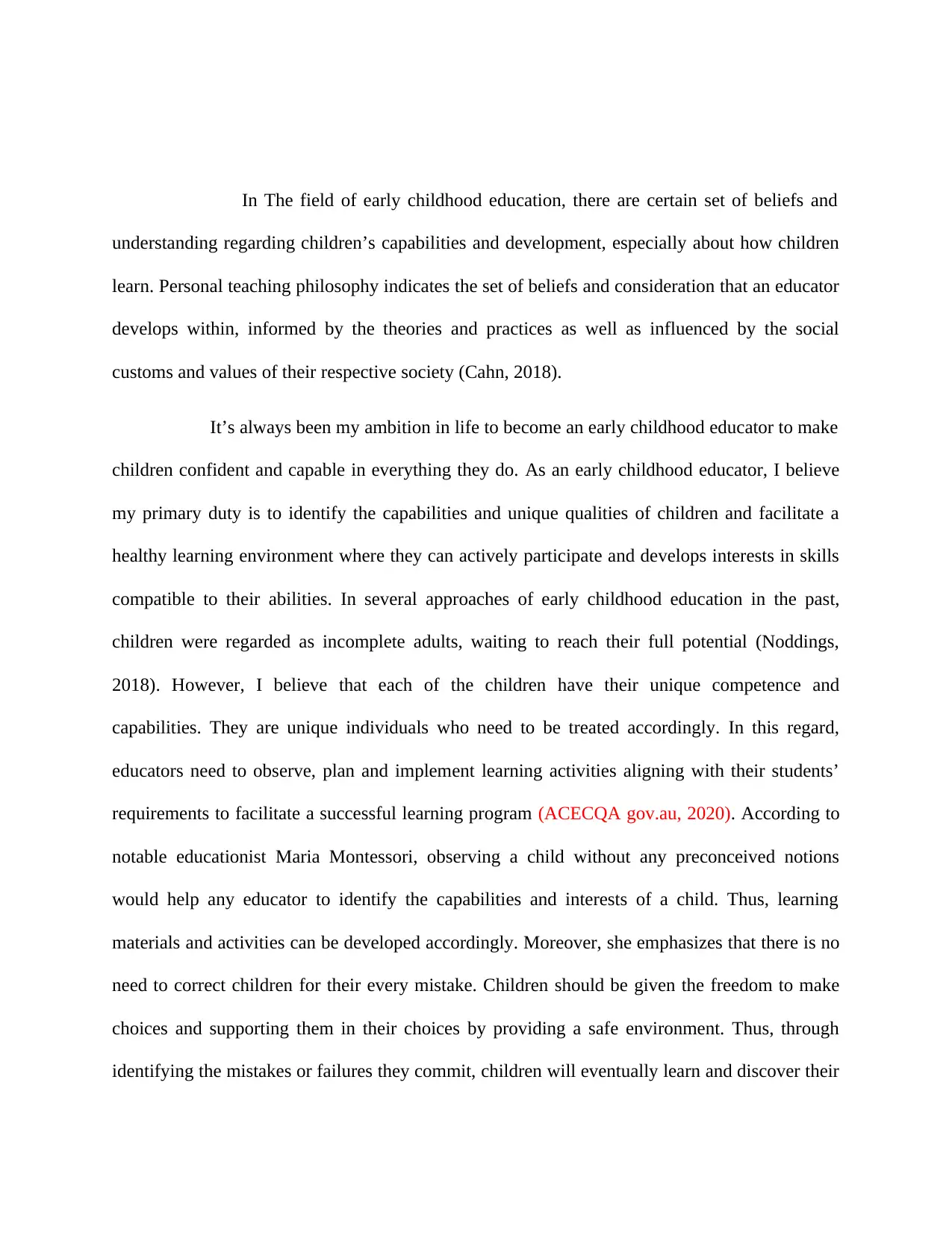
In The field of early childhood education, there are certain set of beliefs and
understanding regarding children’s capabilities and development, especially about how children
learn. Personal teaching philosophy indicates the set of beliefs and consideration that an educator
develops within, informed by the theories and practices as well as influenced by the social
customs and values of their respective society (Cahn, 2018).
It’s always been my ambition in life to become an early childhood educator to make
children confident and capable in everything they do. As an early childhood educator, I believe
my primary duty is to identify the capabilities and unique qualities of children and facilitate a
healthy learning environment where they can actively participate and develops interests in skills
compatible to their abilities. In several approaches of early childhood education in the past,
children were regarded as incomplete adults, waiting to reach their full potential (Noddings,
2018). However, I believe that each of the children have their unique competence and
capabilities. They are unique individuals who need to be treated accordingly. In this regard,
educators need to observe, plan and implement learning activities aligning with their students’
requirements to facilitate a successful learning program (ACECQA gov.au, 2020). According to
notable educationist Maria Montessori, observing a child without any preconceived notions
would help any educator to identify the capabilities and interests of a child. Thus, learning
materials and activities can be developed accordingly. Moreover, she emphasizes that there is no
need to correct children for their every mistake. Children should be given the freedom to make
choices and supporting them in their choices by providing a safe environment. Thus, through
identifying the mistakes or failures they commit, children will eventually learn and discover their
understanding regarding children’s capabilities and development, especially about how children
learn. Personal teaching philosophy indicates the set of beliefs and consideration that an educator
develops within, informed by the theories and practices as well as influenced by the social
customs and values of their respective society (Cahn, 2018).
It’s always been my ambition in life to become an early childhood educator to make
children confident and capable in everything they do. As an early childhood educator, I believe
my primary duty is to identify the capabilities and unique qualities of children and facilitate a
healthy learning environment where they can actively participate and develops interests in skills
compatible to their abilities. In several approaches of early childhood education in the past,
children were regarded as incomplete adults, waiting to reach their full potential (Noddings,
2018). However, I believe that each of the children have their unique competence and
capabilities. They are unique individuals who need to be treated accordingly. In this regard,
educators need to observe, plan and implement learning activities aligning with their students’
requirements to facilitate a successful learning program (ACECQA gov.au, 2020). According to
notable educationist Maria Montessori, observing a child without any preconceived notions
would help any educator to identify the capabilities and interests of a child. Thus, learning
materials and activities can be developed accordingly. Moreover, she emphasizes that there is no
need to correct children for their every mistake. Children should be given the freedom to make
choices and supporting them in their choices by providing a safe environment. Thus, through
identifying the mistakes or failures they commit, children will eventually learn and discover their
Paraphrase This Document
Need a fresh take? Get an instant paraphrase of this document with our AI Paraphraser
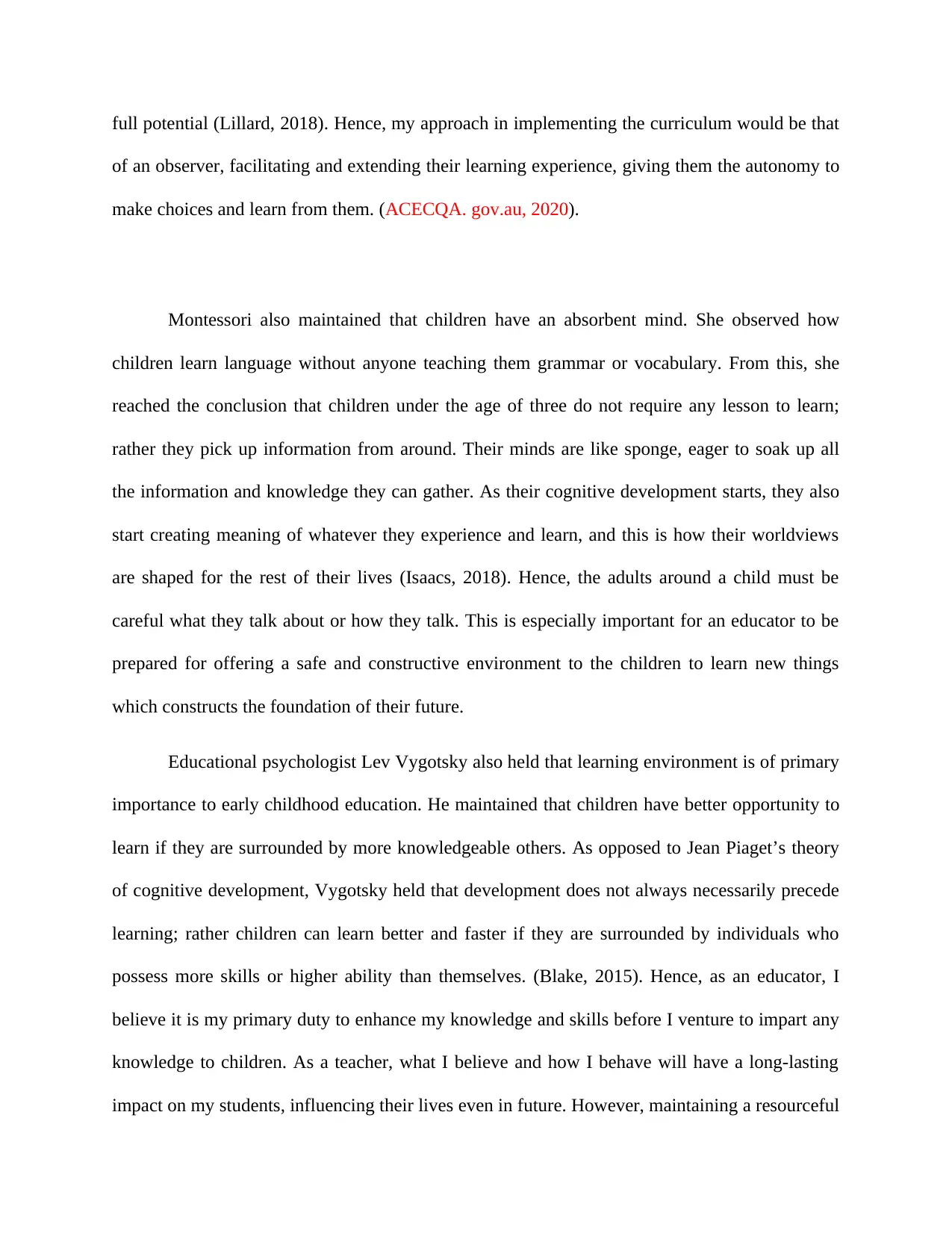
full potential (Lillard, 2018). Hence, my approach in implementing the curriculum would be that
of an observer, facilitating and extending their learning experience, giving them the autonomy to
make choices and learn from them. (ACECQA. gov.au, 2020).
Montessori also maintained that children have an absorbent mind. She observed how
children learn language without anyone teaching them grammar or vocabulary. From this, she
reached the conclusion that children under the age of three do not require any lesson to learn;
rather they pick up information from around. Their minds are like sponge, eager to soak up all
the information and knowledge they can gather. As their cognitive development starts, they also
start creating meaning of whatever they experience and learn, and this is how their worldviews
are shaped for the rest of their lives (Isaacs, 2018). Hence, the adults around a child must be
careful what they talk about or how they talk. This is especially important for an educator to be
prepared for offering a safe and constructive environment to the children to learn new things
which constructs the foundation of their future.
Educational psychologist Lev Vygotsky also held that learning environment is of primary
importance to early childhood education. He maintained that children have better opportunity to
learn if they are surrounded by more knowledgeable others. As opposed to Jean Piaget’s theory
of cognitive development, Vygotsky held that development does not always necessarily precede
learning; rather children can learn better and faster if they are surrounded by individuals who
possess more skills or higher ability than themselves. (Blake, 2015). Hence, as an educator, I
believe it is my primary duty to enhance my knowledge and skills before I venture to impart any
knowledge to children. As a teacher, what I believe and how I behave will have a long-lasting
impact on my students, influencing their lives even in future. However, maintaining a resourceful
of an observer, facilitating and extending their learning experience, giving them the autonomy to
make choices and learn from them. (ACECQA. gov.au, 2020).
Montessori also maintained that children have an absorbent mind. She observed how
children learn language without anyone teaching them grammar or vocabulary. From this, she
reached the conclusion that children under the age of three do not require any lesson to learn;
rather they pick up information from around. Their minds are like sponge, eager to soak up all
the information and knowledge they can gather. As their cognitive development starts, they also
start creating meaning of whatever they experience and learn, and this is how their worldviews
are shaped for the rest of their lives (Isaacs, 2018). Hence, the adults around a child must be
careful what they talk about or how they talk. This is especially important for an educator to be
prepared for offering a safe and constructive environment to the children to learn new things
which constructs the foundation of their future.
Educational psychologist Lev Vygotsky also held that learning environment is of primary
importance to early childhood education. He maintained that children have better opportunity to
learn if they are surrounded by more knowledgeable others. As opposed to Jean Piaget’s theory
of cognitive development, Vygotsky held that development does not always necessarily precede
learning; rather children can learn better and faster if they are surrounded by individuals who
possess more skills or higher ability than themselves. (Blake, 2015). Hence, as an educator, I
believe it is my primary duty to enhance my knowledge and skills before I venture to impart any
knowledge to children. As a teacher, what I believe and how I behave will have a long-lasting
impact on my students, influencing their lives even in future. However, maintaining a resourceful
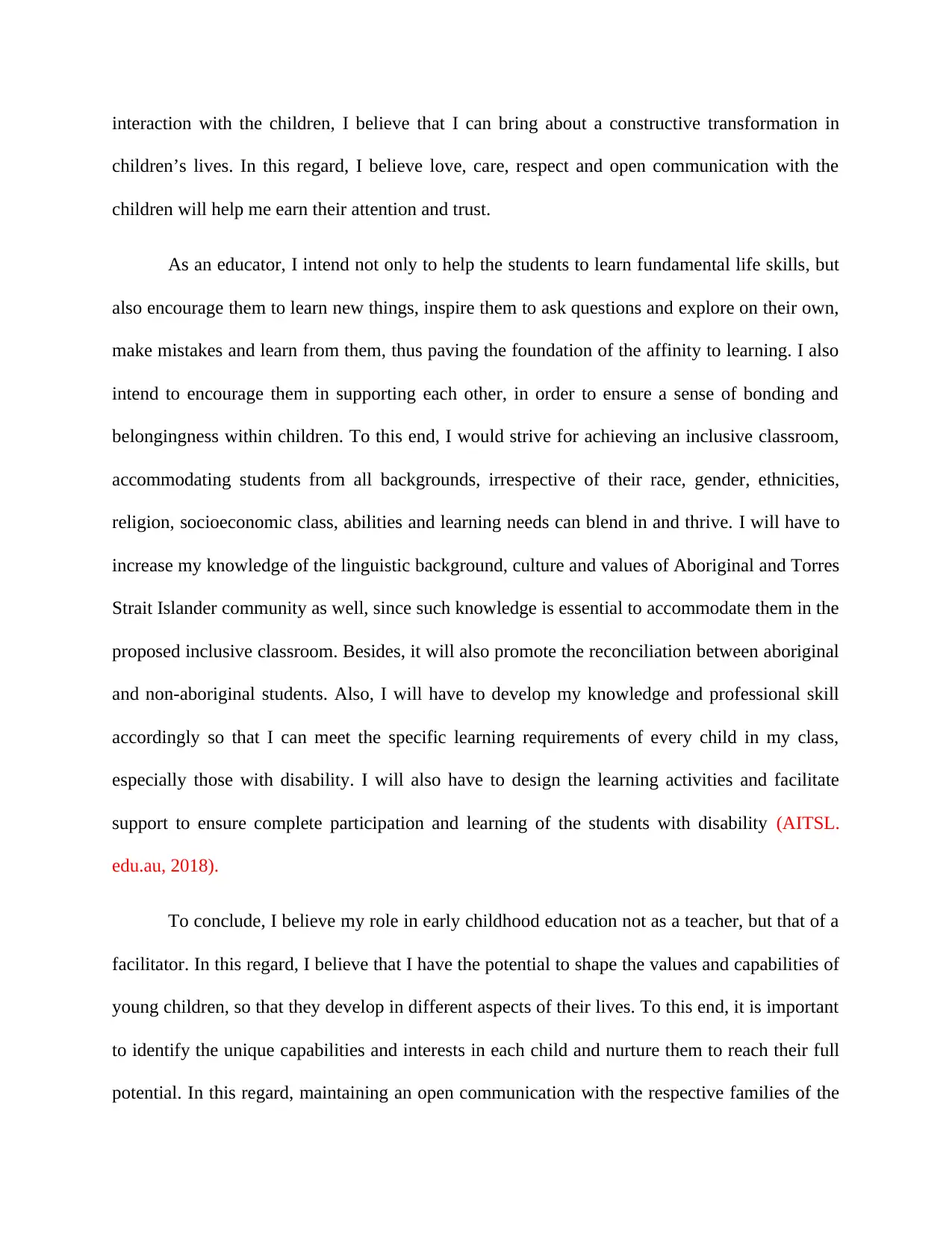
interaction with the children, I believe that I can bring about a constructive transformation in
children’s lives. In this regard, I believe love, care, respect and open communication with the
children will help me earn their attention and trust.
As an educator, I intend not only to help the students to learn fundamental life skills, but
also encourage them to learn new things, inspire them to ask questions and explore on their own,
make mistakes and learn from them, thus paving the foundation of the affinity to learning. I also
intend to encourage them in supporting each other, in order to ensure a sense of bonding and
belongingness within children. To this end, I would strive for achieving an inclusive classroom,
accommodating students from all backgrounds, irrespective of their race, gender, ethnicities,
religion, socioeconomic class, abilities and learning needs can blend in and thrive. I will have to
increase my knowledge of the linguistic background, culture and values of Aboriginal and Torres
Strait Islander community as well, since such knowledge is essential to accommodate them in the
proposed inclusive classroom. Besides, it will also promote the reconciliation between aboriginal
and non-aboriginal students. Also, I will have to develop my knowledge and professional skill
accordingly so that I can meet the specific learning requirements of every child in my class,
especially those with disability. I will also have to design the learning activities and facilitate
support to ensure complete participation and learning of the students with disability (AITSL.
edu.au, 2018).
To conclude, I believe my role in early childhood education not as a teacher, but that of a
facilitator. In this regard, I believe that I have the potential to shape the values and capabilities of
young children, so that they develop in different aspects of their lives. To this end, it is important
to identify the unique capabilities and interests in each child and nurture them to reach their full
potential. In this regard, maintaining an open communication with the respective families of the
children’s lives. In this regard, I believe love, care, respect and open communication with the
children will help me earn their attention and trust.
As an educator, I intend not only to help the students to learn fundamental life skills, but
also encourage them to learn new things, inspire them to ask questions and explore on their own,
make mistakes and learn from them, thus paving the foundation of the affinity to learning. I also
intend to encourage them in supporting each other, in order to ensure a sense of bonding and
belongingness within children. To this end, I would strive for achieving an inclusive classroom,
accommodating students from all backgrounds, irrespective of their race, gender, ethnicities,
religion, socioeconomic class, abilities and learning needs can blend in and thrive. I will have to
increase my knowledge of the linguistic background, culture and values of Aboriginal and Torres
Strait Islander community as well, since such knowledge is essential to accommodate them in the
proposed inclusive classroom. Besides, it will also promote the reconciliation between aboriginal
and non-aboriginal students. Also, I will have to develop my knowledge and professional skill
accordingly so that I can meet the specific learning requirements of every child in my class,
especially those with disability. I will also have to design the learning activities and facilitate
support to ensure complete participation and learning of the students with disability (AITSL.
edu.au, 2018).
To conclude, I believe my role in early childhood education not as a teacher, but that of a
facilitator. In this regard, I believe that I have the potential to shape the values and capabilities of
young children, so that they develop in different aspects of their lives. To this end, it is important
to identify the unique capabilities and interests in each child and nurture them to reach their full
potential. In this regard, maintaining an open communication with the respective families of the
⊘ This is a preview!⊘
Do you want full access?
Subscribe today to unlock all pages.

Trusted by 1+ million students worldwide
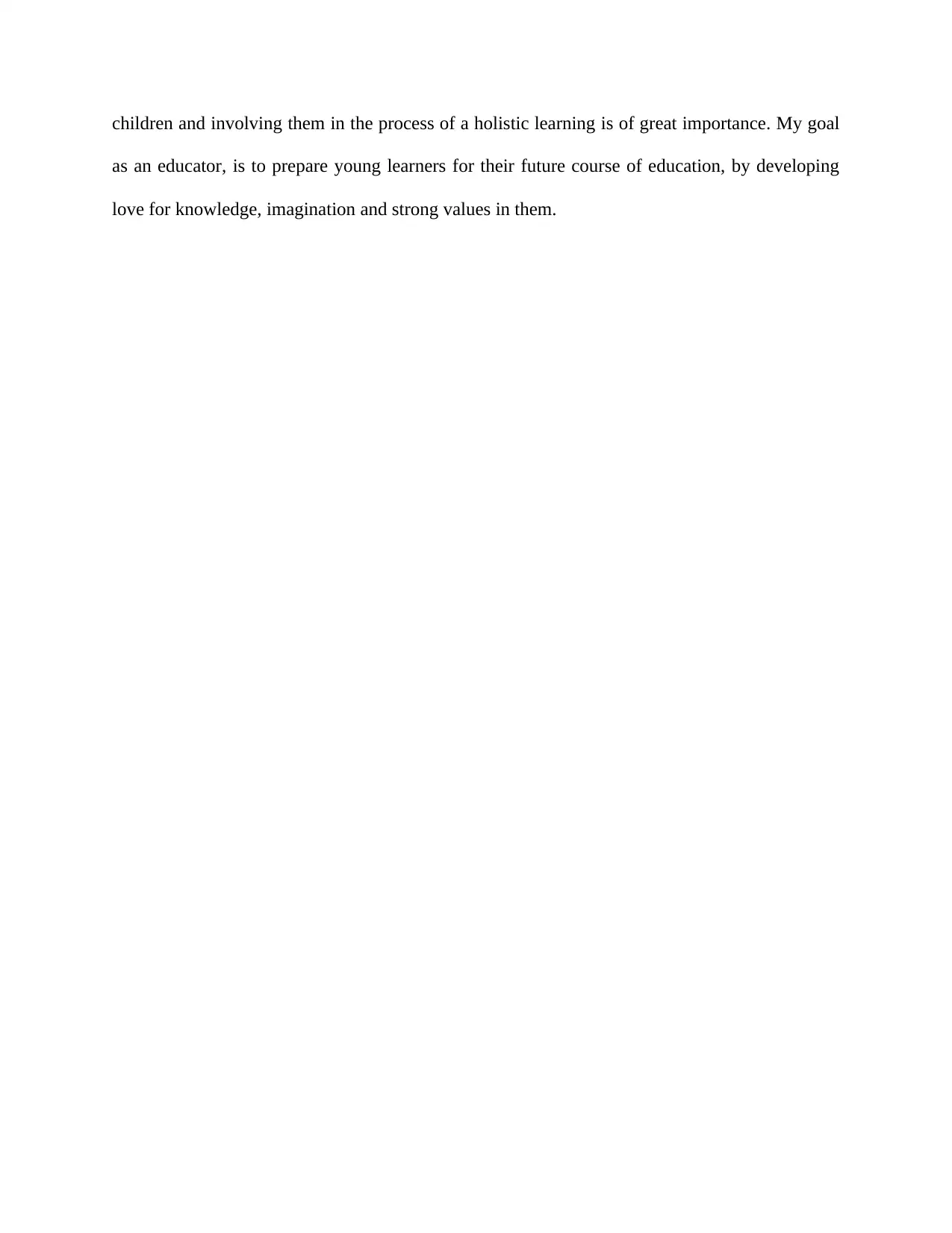
children and involving them in the process of a holistic learning is of great importance. My goal
as an educator, is to prepare young learners for their future course of education, by developing
love for knowledge, imagination and strong values in them.
as an educator, is to prepare young learners for their future course of education, by developing
love for knowledge, imagination and strong values in them.
Paraphrase This Document
Need a fresh take? Get an instant paraphrase of this document with our AI Paraphraser
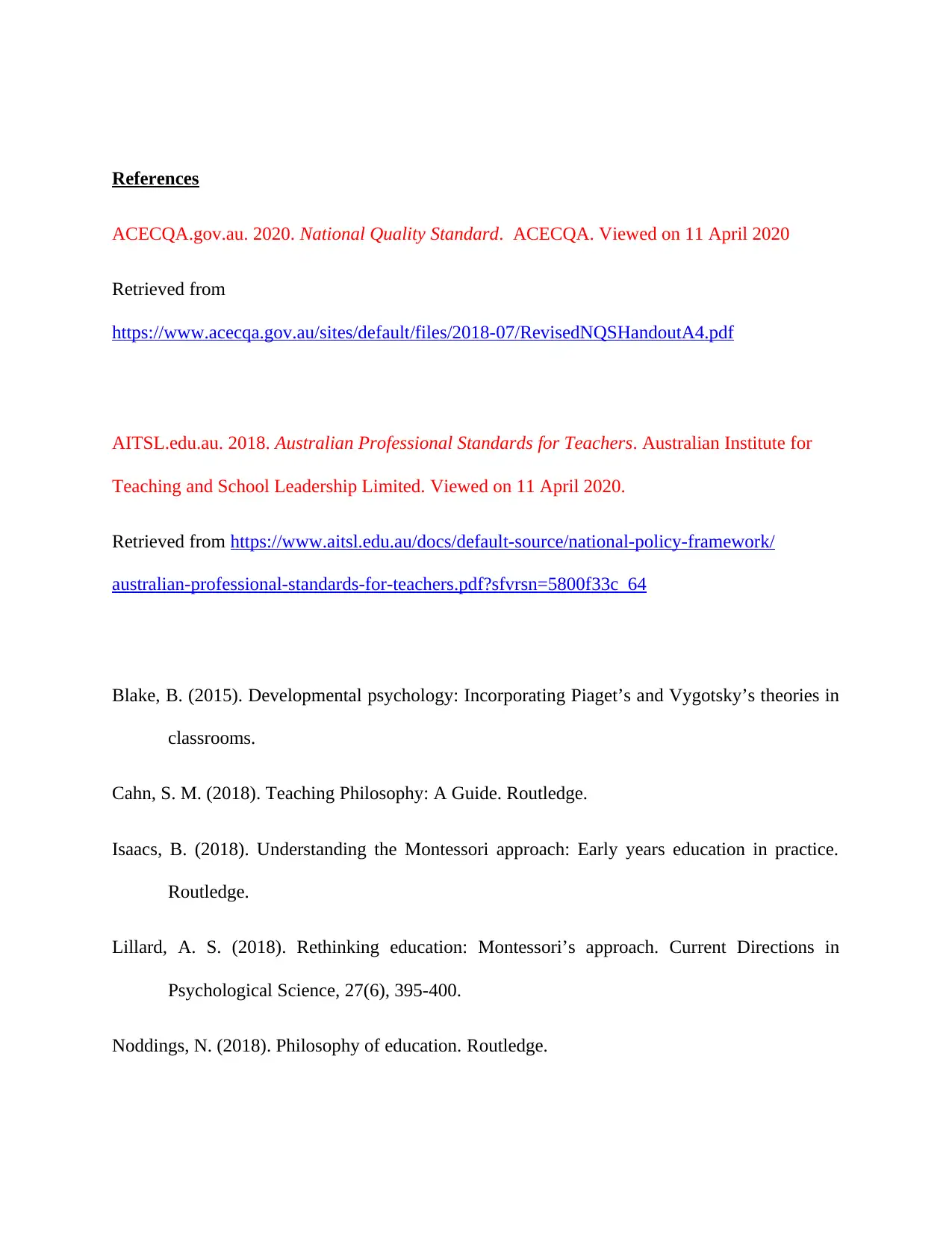
References
ACECQA.gov.au. 2020. National Quality Standard. ACECQA. Viewed on 11 April 2020
Retrieved from
https://www.acecqa.gov.au/sites/default/files/2018-07/RevisedNQSHandoutA4.pdf
AITSL.edu.au. 2018. Australian Professional Standards for Teachers. Australian Institute for
Teaching and School Leadership Limited. Viewed on 11 April 2020.
Retrieved from https://www.aitsl.edu.au/docs/default-source/national-policy-framework/
australian-professional-standards-for-teachers.pdf?sfvrsn=5800f33c_64
Blake, B. (2015). Developmental psychology: Incorporating Piaget’s and Vygotsky’s theories in
classrooms.
Cahn, S. M. (2018). Teaching Philosophy: A Guide. Routledge.
Isaacs, B. (2018). Understanding the Montessori approach: Early years education in practice.
Routledge.
Lillard, A. S. (2018). Rethinking education: Montessori’s approach. Current Directions in
Psychological Science, 27(6), 395-400.
Noddings, N. (2018). Philosophy of education. Routledge.
ACECQA.gov.au. 2020. National Quality Standard. ACECQA. Viewed on 11 April 2020
Retrieved from
https://www.acecqa.gov.au/sites/default/files/2018-07/RevisedNQSHandoutA4.pdf
AITSL.edu.au. 2018. Australian Professional Standards for Teachers. Australian Institute for
Teaching and School Leadership Limited. Viewed on 11 April 2020.
Retrieved from https://www.aitsl.edu.au/docs/default-source/national-policy-framework/
australian-professional-standards-for-teachers.pdf?sfvrsn=5800f33c_64
Blake, B. (2015). Developmental psychology: Incorporating Piaget’s and Vygotsky’s theories in
classrooms.
Cahn, S. M. (2018). Teaching Philosophy: A Guide. Routledge.
Isaacs, B. (2018). Understanding the Montessori approach: Early years education in practice.
Routledge.
Lillard, A. S. (2018). Rethinking education: Montessori’s approach. Current Directions in
Psychological Science, 27(6), 395-400.
Noddings, N. (2018). Philosophy of education. Routledge.
1 out of 5
Related Documents
Your All-in-One AI-Powered Toolkit for Academic Success.
+13062052269
info@desklib.com
Available 24*7 on WhatsApp / Email
![[object Object]](/_next/static/media/star-bottom.7253800d.svg)
Unlock your academic potential
Copyright © 2020–2026 A2Z Services. All Rights Reserved. Developed and managed by ZUCOL.





